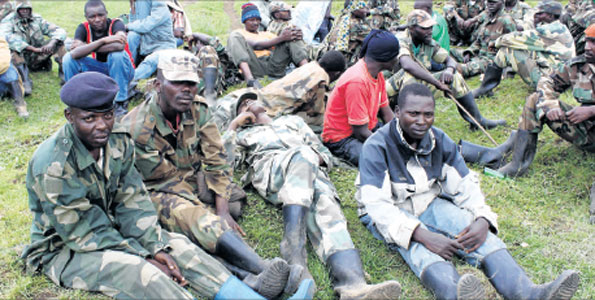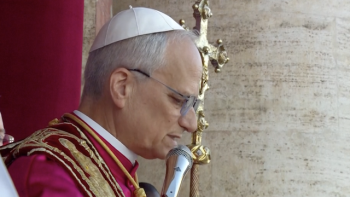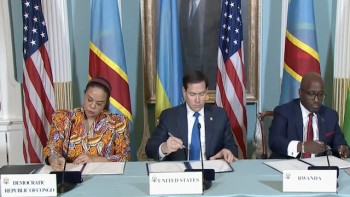Congolese and Rwandan defense ministers met in Kigali on September 24, 2015, to renew a Secret Accord signed in 2009, sources close to the DRC Minister of Defense have told AfroAmerica Network. Congolese minister Aime Ngoy Mukena and Rwandan minister James Kabarebe met in the Rwandan capital Kigali, to, according to official statements, work toward a rapprochement.
The two countries' diplomatic relationship has been especially strained since
2012, after the Rwandan backed M23 rebels invaded the Eastern part of the Democratic Republic of the Congo and massacred scores of Congolese civilians. The accord will allow both governments to conduct joint operations, to hunt down Rwandan refugees, repatriate those disarmed and currently regrouped in camps in Kisangani, Kanyabayonga and South-Kivu.
The initial accord was signed on February 6, 2009. Rwandan and Democratic Republic of the Congo signed the Secret Accord at the Serena Hotel, Rubavu, Western Province, Rwanda. It was the result of secret negotiations between the two governments represented by foreign affairs ministers Ms Rose Marie Museminali of Rwanda and Mr. Alexis Thambwe Mwamba, of DRC.
The Secret Accord, specifically in paragraph 8, gave to the Rwandan Special Forces working with FARDC the permission to enter the DRC territory to target Rwandan refugees, labelled "ex-FAR/Interahamwe" in the accord, and repatriate them "peacefully or forcefully, instead of allowing them to resettle on the DRC territory."
The Accord was signed when a group of Rwandan refugees had been disarmed and regrouped in Kasiki, Lubero territory, North-Kivu, by the National Democratic Congress (NDC), an umbrella of Rwandan rebel groups, within the framework of what was called Kisangani/Rome process. The Kisangani/Rome process had resulted from negotiations between DRC Government and NDC, under the mediation of Sant'Egidio Community, Eglise du Christ au Congo (ECC) and SIK-Norway. Three days after the Secret Accord was signed, the Rwandan Special Forces attacked the disarmed Rwandan refugees in Kasiki, hence putting an end to the process.
At the time, Joseph Kabila's goverment signed the Secret Agreement to bring in Rwandan Special Forces, while negotiating with NDC to disarm and regroup refugees, who included women, children and elderly. Only he and his confidents, especially the head of Military Intelligence Colonel Yav, Joseph Kabila's right and left arms, the now disgraced General John Numbi and the late Katumba Mwanke, the Security Advisor at the time, Professor Kaumba and his representatives in the Kisangani/Rome process, Ambassador Seraphin Ngwej and Bishop Dr. Kuye Ndondo.
This time, Rwandan refugees in the three camps are composed of former Rwandan rebels of the FDLR, along with their dependents. The ex-FDLR voluntarily disarmed last year and have been waiting for repatriation, resettlement or relocation.
With the accord, the Rwandan government has also agreed to repatriate the Congolese ex-M23 rebels, who were once funded and backed by Rwanda and led a bloody invasion of the Eastern DRC, before being almost decimated by the Forces of Intervention Brigade, composed of troops from Tanzania, Malawi, and South Africa and acting under the Unitted Nations mandate.
©2015 AfroAmerica Network, All Rights Reserved.

















